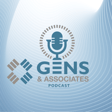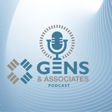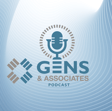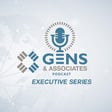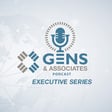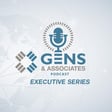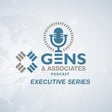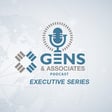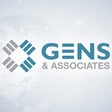Become a Creator today!Start creating today - Share your story with the world!
Start for free
00:00:00
00:00:01

Service Provider Series Episode #1: Padmanabham Navuluri (Genpact)
In the premiere episode of our Regulatory Executive Service Provider, host Steve Gens is joined by Padmanabham Navuluri or “Paddy” (Vice President and Head of Pharma Quality and Regulatory Affairs at Genpact) to discuss how Genpact has supported many regulatory organization transformations, the new era of innovation with A.I. and automation, and what to expect from Genpact regulatory services in the future.
Transcript
Introduction to the Podcast Series
00:00:00
Speaker
Hi, this is Steve Gens, managing partner of Gens & Associates, and welcome to our regulatory executive podcast series focusing on key executives that provide service or software to the regulatory space. Today, I'm excited to have a key executive from Genpak.
00:00:18
Speaker
here with us and somebody that I've known for over 10 years and have done some very interesting projects. So Patti, I'm glad you're here. I've been looking forward to this conversation.
Introducing Patti and Genpak
00:00:30
Speaker
The industry is shifting, especially for the service providers. So I know everybody knows you as Patti, but once you do a brief introduction of yourself and a little bit about Genpak from the regulatory services standpoint, then we'll get started.
00:00:47
Speaker
ah Hi, Steve. Thanks for having me. As an introduction, I lead Genpact's regulatory and quality practice based in New Jersey. We provide end-to-end regulatory services, strategy, CMC, labeling, submission management, publishing, and related services.
00:01:06
Speaker
ah We believe that we have a somewhat of a unique position in the industry because we combine two distinct capabilities. One is the deep domain experience of solving diverse challenges in regulatory, and two, the ability to transform regulatory through process, data, tech, and AI expertise.
Patti's Career Journey and Passion for Regulatory Work
00:01:26
Speaker
We are part of Genpak's life census vertical. ah For our listeners who may not have heard of Genpak, we're a professional services firm with about four and a half billion dollars in sales listed on New York Stock Exchange with actually the single letter G. We were part of G originally and divested from G in 2005.
00:01:46
Speaker
I have somewhat of an interesting career before I landed in regulatory. I started my career actually as an engineer and subsequently moved into roles across finance, operations, strategy, and process re-engineering. I started working in pharma, R and&D, and regulatory about a decade ago when Jetpack was expanding its focus. I like this industry. I felt that the work we do gives more meaning and more closely aligned with my purpose, so stayed within this regulatory domain.
00:02:17
Speaker
I started my career in India, spent some time in Europe, setting up our Eastern European operations and now based in New Jersey in the US. So I have this cross-functional and multicultural exposure, which helps a lot in my current role as the business leader for our regulatory and quality business. I work with clients in helping to solve diverse challenges and kind of moving that regulatory functions forward.
00:02:43
Speaker
I really like this job, connecting with clients and our teams across the world, solving problems and playing a small role in bringing innovation to patients.
Evolution of Regulatory Processes Over the Decade
00:02:52
Speaker
So that's a bit of introduction to me, Steve.
00:02:55
Speaker
Okay, thanks a lot, Patty. And you know certainly some of the things that you mentioned, I think that's where we're gonna start off. So you know as you know, there's been a tremendous amount of change you know in regulatory over the last 10 years. So we've talked starting in 2013 with our benchmark data that we thought, and it ended up being true that it would be the decade of regulatory, we use the term modernization, others use the words you know kind of transformation.
00:03:24
Speaker
But you know a lot of changing, thinking about you know global, all the local affiliate markets, change in regulatory processes, global systems, global processes for some companies, even the operating model and regulatory. And with our total addressable market, you know we believe you know combining software and the services. It's been over the past five years over a $7 billion US spend. I mean, it's been tremendous.
00:03:52
Speaker
on that so ah before we get into that big AI automation you know kind of conversation we're going to have if you could briefly just tell the the listeners because we've had a few clients that we've worked together with you know kind of over the years so that how has Genpak or your service line kind of supported some of the transformations and regulatory, and then we'll start focusing kind of on the the future with AI automation. And that'll be an interesting thing. But yeah, maybe over the last five years, what are some of the key things, mainly for the listeners that don't know you and Genpak and how you've contributed to the regulatory transformation?
Genpak's Strategies and Techniques
00:04:30
Speaker
Yeah, so there's been a tremendous change in the last five, 10 years, as we know,
00:04:35
Speaker
We are proud to have partnered with several clients in their transformation in systems, processes, operating model, and I'd also add a fourth dimension data, which we now view as foundational. ah We like to think of this like a house with data as a foundation with ah with the systems and processes and operating model kind of forming the rest of the house.
00:05:02
Speaker
and which is how we think of creating a best-in-class regulatory organization. So beginning with each of these topics i and a little bit more, we have inherited a lot of process expertise from GE, General Electric, in terms of Lean Six Sigma and process excellence. Earlier on, I was certified as a green belt and as a lean coach, and majority of our process associates are actually trained and certified in driving process excellence.
00:05:30
Speaker
When we work with work with clients, we observe that many a time their processes are complex. There is wide variation between their business units and geographies. We typically begin with what we call is the value stream mapping, bringing all stakeholders into a single room and mapping the process end to end. It's and ah an eye opener for many of the process owners when they see the number of unnecessary process steps, unnecessary controls, checkpoints, and reporting, and so on. For example, we worked with a top 10 client on improving the timeliness of a lifecycle submission, a natural renewal process, and then you know from over 40% to 50% to over 95% moving it like a last minute heroic process to a standard and reliable process.
00:06:22
Speaker
So that's on the process. And then kind of moving to systems and data, as you know, most in the industry are moving towards a unified regulatory platform, be it Viva or some other platform. We've been part of several of their journeys right from helping clients in creating a technology roadmap, right? Like the client, for example, that you and I worked on about 10 years ago, selecting the right platform, creating a business case,
00:06:50
Speaker
and then helping clients implementing their chosen platform. One thing we often notice is that many underestimate the effort involved in getting complete and accurate data.
00:07:01
Speaker
So we help them with the data enrichment, data migration. We as business users ourselves, we kind of deal with the data so we understand the complexity of it. The data is kind of in legacy systems at the affiliate level and then kind of in various documents. So we kind of developed several tools and practices to extract this data efficiently and make sure that the new system our clients are implementing has complete and accurate data.
00:07:30
Speaker
so that the users can adapt to the new system and clients can get maximum value from their investments and in the platform they're implementing. And finally, the last piece is the operating model, and there has been a sea change in operating models. Many organizations are looking for flexible, agile, cost-effective operating models to balance their priorities, such as the need to support their high-growth products and strategic strategic initiatives while maintaining the safety and compliance of their marketed products.
00:08:00
Speaker
We have set up regulatory centers of excellence to help clients achieve this balance. Many clients have been able to keep their headcount and operational budgets lower whileat cheing while achieving growth and supporting strategic initiatives like mergers, acquisitions, pinoffs, which as you know, has been a major topic in the last five years. So we focused on keeping their marketed product safe and compliant and kind of enable their growth in worldwide markets.
00:08:33
Speaker
Yeah and that has been a lot of work for you guys and it just a tremendous change in industry and I that one client are our New Jersey client you mentioned because I even um remember they brought you you and your team in they hired me separately to keep keep an eye and kind of work with you because they were really really busy and I just remember just the intensity because like back then it's like the old model, their central regional hubs, the local affiliates struggle with the passing of information, many, many disparate systems. And I think you guys did at least 10 to 15 iterations on the business case. And these were big numbers and expecting very, very big you know value you know from the transformation.
00:09:16
Speaker
you know Because ultimately, people wanted to get you know global capabilities, everything on one page, which certainly you know with ah with your client there, they were very successful. Before other companies, they were more of an early adopter you know to really getting to global capabilities.
00:09:33
Speaker
you know a unified approach we call it and and getting all on the same page so you can be a lot more efficient cuz you're really really reducing a lot of complexity so you know you get done with all that work and then you sit back and say well what's next so the what's next that the big what's next and i think the conversation really kind of started around 2022, just was huge.
AI and Automation in Regulatory Services
00:09:58
Speaker
And I think people didn't know what to make of it last year with AI, generative AI, automation, and still some people are confused about the difference between AI and automation. But it's such a big conversation today. And certainly, I know you work with a lot of clients that, okay, let's take these concepts into proof of concepts, right?
00:10:17
Speaker
And really, where is the value? So this like next stage of and ah innovation that we're entering. So my question for you is like, how do you drive innovation for your clients? And it would be really interesting from your and the kind of the Genpak viewpoint both at a regulatory level, you know then the broader R and&D function level, what do you see as the opportunities in the near term, maybe in the next year with AI automation in the longer term? Because like everybody's focused on this. So so what do you see, Patti? It's a great question, Steve. It's a topic that dominates most of our conversation with our clients these days.
00:10:57
Speaker
First of all, I believe that we're the cusp of another technology revolution. And of course, a cliche to say this, but I truly believe that akin to electricity or a mobile for an internet.
00:11:12
Speaker
Just like internet is putting information at our fingertips, AI is putting expertise at our fingertips, particularly in regulatory, which involves cognitive tasks like planning, analyzing, redacting, summarizing. I believe that AI will make a tremendous contribution towards making regulatory professionals more productive and making processes faster.
00:11:37
Speaker
We are betting big on AI, and we have announced a new growth strategy called as Genpak Next. It's about focusing on applying AI to drive key cloud outcomes. Our goal is to make Genpak a beacon of AI-led transformation. We recently did an ah AI day in New York ah for Genpak's clients across industries and processes, and we had pharma regulatory also represented there.
00:12:06
Speaker
And then our CEO said there, it's ah it's not a question of what AI can do, but how to adopt it at scale today. In our experience, as also as a long-term practitioners, we think there are three critical attributes necessary for any successful AI adoption. One is deep to domain knowledge, understanding how AI fits into the overall process and applying it meaningfully in our work.
00:12:37
Speaker
And second is integrating technologies, combining AI with customer and market understanding to drive faster and smarter outcomes. And the third piece and very important piece is talent. How do you kind of build a talent pool of talent that is continuously learning, adapting, and building expertise in AI and advanced technologies as we kind of transform the process together?
00:13:03
Speaker
So we think that these are the three really critical attributes you know in kind of applying AI. When you combine these three, I see tremendous opportunity to drive productivity in R and&D you know in terms of in shortening clinical trial durations, in increasing efficiency of development spending, or increasing the overall molecular entity success rate.
00:13:29
Speaker
and closer in regulatory, there are opportunities across the value chain, right? From strategy and in gathering competitive intelligence, using predictive analytics and planning, or using Gen AI and creating reports, or in answering health authority questions and so on.
00:13:47
Speaker
When I see the former landscape now under tremendous opportunity, I was just reading in The Economist yesterday about everything drugs, about the GLP-1 RAs that have the potential to be one of the most successful class of drugs.
00:14:03
Speaker
then there is a messenger RNA platform for providing a new class of vaccines for a variety of diseases. So there's NOVA and Li-Li that have added more than a trillion dollars of market value in the recent years. So then there's all this innovation and immunotherapy. So on one hand, there is this tremendous innovation and the other hand, the potential to harness AI and accelerate value through AI.
00:14:30
Speaker
so So Steve, I think there's a truly a remarkable period to be in pharma and be part of this transformational journey. Yeah, yeah I certainly agree with this. And I really like your term, the beacon. you know I wrote that down. so I'm a visual person, so that metaphor really grabbed me on that. And and certainly, you know and I couldn't agree with you more like you know as we work with clients, and and especially if it's on the AI side or the automation. like you know um how how to equate value, how do you measure kind of these experiments, you know, more the governance side, but, you know, having that deep domain knowledge, because especially in regulatory, it's the small things that make a difference, like consistency of process and the submission dossier, if you can actually do that, there's a higher degree of success for for automation and all that. and
00:15:21
Speaker
ah We've been seeing, and we're part of conversations to your point about talent. People are using terms upskilling or talent development. How do we accelerate talent development? Because it's moving. And you know and it's easy to say, hey, AI and automation, but like you you're familiar with our research. We have nine buckets you know of kind of a technology that are underneath us all. and Some are moving quicker and others not. It's kind of the passing fade. But, you know, from our chair, the generative AI, and especially on the ah the at the writing, and we we see it more as an assistant or augmentation. I know there's a lot of fear that, you know,
00:16:03
Speaker
you know, and I'm being silly here that hey, with AI and everything, we're going to sit on the beach and the machines are going to do all the work, you know, it's just if you have the metaphor, which I believe, and I think other thought leaders that at the end of the day, let's not be scared of it, it can be a good assistant instead of being able to read, um you know, I don't have the ability to read 100 or 200, you know, health authority correspondence, I can put in and have the machine do that get back, you know, again, as an assistant. And boy, you know, I have a lot more analysis to do, you know, more time in that critical thinking, you know, type of thing. So I agree with it. It's it's just a really fascinating time, you know, and how fast this goes, I think everybody's guessing.
00:16:45
Speaker
You know, you know, we just opened up our survey where we're looking both at the industry side on industry readiness for all this. And then on the software provider side, you know, from a maturity lens and how does it kind of connect up. But certainly very, very exciting times.
00:17:01
Speaker
So with that said, I think the last thing our listeners would love you know to hear from you, um you know your services organization, you support such a broad ah stretch of life sciences and you have deep expertise and regulatory. And I know in quality, there was a big modernization going on too, kind of just like what we witnessed with regulatory in the
Genpak's AI Solutions and Industry Impact
00:17:22
Speaker
last 10 years. so So um what should we expect from the Genpak regulatory services or even or the quality services in the coming years, Patti? Yeah, so the biggest thing for us is to stay relevant for clients and help them in their transformation, be it systems, data, process, our operating model.
00:17:44
Speaker
Genpak is hind investing heavily in AI. And then we would like to bring those investments and then those assets into regulatory. ah And with my background in engineering and the cross-functional expertise exposure I had, I feel fortunate to be in this position to shape our journey in the next few years. Applying AI in regulatory is a topic actually close to my heart. And then we hope to make a significant contribution to the regulatory in this industry in this area. We are developing solutions across the regulatory value chain. We have developed a solution for a client to gather competitive intelligence for a specific therapeutic area. It tracks that area and informs them of the key competitive milestones and any compliance related developments so that they are alerted and can take actions early on.
00:18:39
Speaker
We are developing a solution to gather regulatory requirements with AI. As you know, it's an industry challenge to keep the regulatory requirements up to date. So our solution will achieve that and will provide the very granular, actionable intelligence for regulatory people. Then we have developed a solution to summarize regulatory sections. For example, creating module 2.3 quality overall summary from module 3.
00:19:07
Speaker
Then we have developed a solution that will create an automated response to a health agency question. Then we have a solution to synchronize planning between regulatory quality and supply chain to plan and execute mergers, acquisitions, divestiture type events.
00:19:24
Speaker
So we're developing a bunch of solutions across the value chain to help regulatory professionals. As we mentioned, it's not about replacing anyone, but making them more productive, making the process faster. Collectively, we call this as like a regulatory co-pilot that will make regulatory professionals more productive. So we expect to help our clients in their AI journey, continue to be part of their operating model journey as they look for more agile, flexible operating models to support not just their headquarters, but also at a local regional level and the help implement and achieve maximum value from their systems-related in initiatives, room-related initiatives, ah using a process and data expertise. So that's what we're focusing on, Steve. Yeah, and I can say out of kind of the the many things that you listed,
00:20:23
Speaker
I classify them as unmet needs. I mean, every biopharmaceutical and regulatory does this, but they struggle.
Closing Remarks and Connections
00:20:30
Speaker
It's very headcount intensive. It's not fun work, gathering all that competitive intelligence, the regulatory intelligence, the requirements, and people have been working so hard on the health authority questions, not only the ingestion and trying to automate the ingestion, but what you describe an automated response, or at least version one of that response.
00:20:52
Speaker
And yeah if your solutions can do that, I would put it in the air quotes breakthrough. you know it's It's been a long unmet need and and a struggle. So if you guys are breaking through that, that's that's very exciting. And I love the term here. I wrote it down, you know the regulatory co-pilot.
00:21:10
Speaker
I think that's very telling, you know, and that's what my belief that AI can do. It's it's really that assistant or a co-pilot. So that's great. um Very exciting times, I agree. So, you know, thanks so much for the time. And I'm sure, you know, some listeners might want to get ahold of you. So, you know, is it through your website, you know, LinkedIn, like how if they have questions or want to follow up with you, how should they get in touch with you, Patty?
00:21:40
Speaker
So in any of the forums on LinkedIn, for example, they leave a comment on LinkedIn and we'll be happy to um get in touch with them. So ah first of all, thanks for having me, Steve. It's been, ah of course, we've known each other and then I always enjoyed working with you for the over the last 10 years. And then thanks for having me. I enjoyed participating and connecting with the our audience via this medium.
00:22:05
Speaker
and look forward to hearing their thoughts, their ideas, and how they are driving transformation with AI and how their experience has been. So look forward to connecting with some of our listeners.
00:22:17
Speaker
ah Excellent. And i for our listeners, I certainly would encourage it. And from this side too, if you have so many questions, you know, I'm very active on LinkedIn, just, you know, send me a message through LinkedIn or on our website, we have the contact tab. And if there's any kind of question, you know, for us on the the GANS team, just ah let us know.
00:22:39
Speaker
So, Patty, thanks again. Wonderful to connect and you know learn learn a little bit more about where the train at Genpak is going and what you're doing personally. Always a pleasure. And for our listeners, us ah stay tuned. This is just the start of the Regulatory Executive Service Provider series. A lot more to come.
